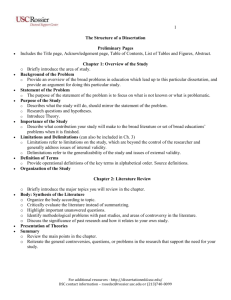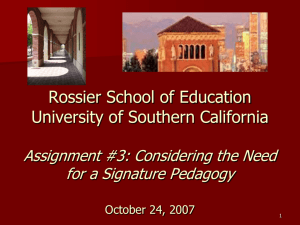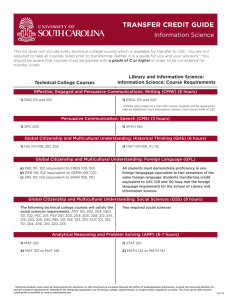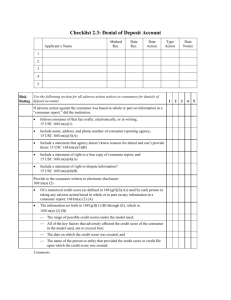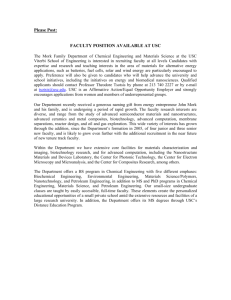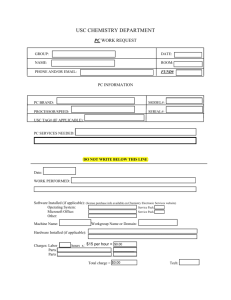University of Southern California presentation
advertisement
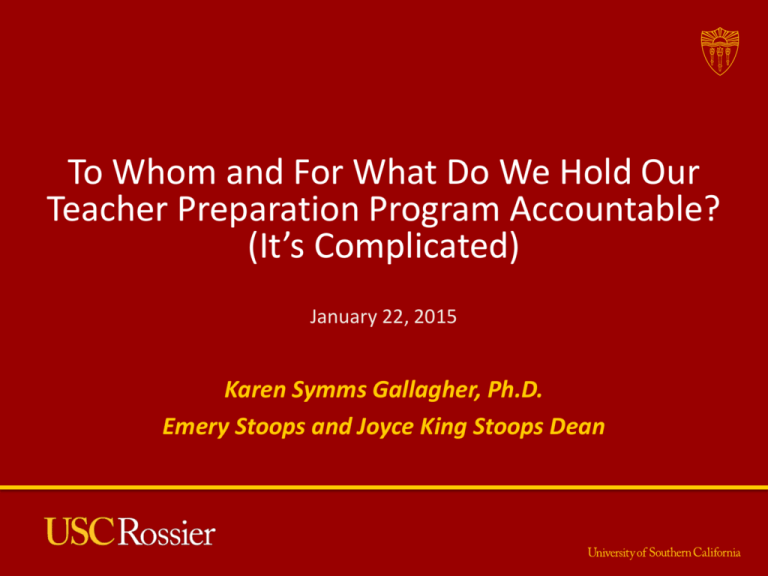
1 To Whom and For What Do We Hold Our Teacher Preparation Program Accountable? (It’s Complicated) January 22, 2015 Karen Symms Gallagher, Ph.D. Emery Stoops and Joyce King Stoops Dean The USC Rossier School • Mission: To improve learning in urban education locally, nationally and globally • Vision: A world where every student, regardless of personal circumstance, can learn and succeed 2 What Do We Mean by Accountability? • USC Rossier believes in mission-driven accountability that continuously improves practice • USC Rossier believes accountability decisions are based on multiple and varied measures that disaggregate across student, faculty, degree program and school levels • USC Rossier believes accountability measures are internally and externally derived 3 3 Rossier Commitment • Our formal commitment to all graduates of USC Rossier is that we will provide our graduates with a range of resources as they start and build their careers – from access to materials from their programs to consultations to alumni networking to professional development programs • This is life-long and world-wide 4 4 USC Context USC Rossier MAT 1880 1909 2004 42,000 18,000 (UG) 2000 890 Demographics 13% Hispanic 4% Black/AA 22% Hispanic 12% Black/AA 18% Hispanic 14% Black/AA International 13% 7% 7% FT Faculty 3786 78 23 Founded Current Enrollment on-campus; online Degrees/ Time to Degree 91% in 6 yrs (UG) 6 Masters (2 yrs) 3 EdD (3 yrs) 1 PhD (4 yrs) 5 terms online 13 months on campus 5 5 Masters of Arts in Teaching with California Teaching Credential • 5 Credential Options Elementary and Secondary (English, Social Sciences, Math and Sciences) • 2 Delivery Formats 1. On-campus: Once per year start / FT / 13 months 2. Online: Now 3 starts / PT&FT / 15 - 24 months • Same admissions criteria, curriculum, & faculty Students assigned a school locally, 20 weeks Guided Practice (Student Teaching) 6 6 Online Learning at USC under Max Nikias 2001+: As Viterbi School of Engineering Dean Built the Distance Education Network (DEN) 2005+: As Provost Declared that every school would have an online program Invested millions in technology 2010+: As President Established the following rules for online: • For graduate and professional degrees only • Academic rigor, integrity and excellence above all • Normal admissions standards and regular tuition • USC retains sole responsibility for ensuring academic quality • No online programs for undergraduates C. L. Max Nikias 7 Growth in Number of Graduates Between 2004 - 2010 fewer than 200 Between 2010 - 2014 2200 8 The Evolution of the Online MAT • 65% graduates are MAT with CA credential • Top CA employers – LAUSD, SDUSD, SFUSD, Green Dot, ICEF • Placements in 650 districts/361 CA districts in AY15 • 5% of placement sites had 10 or more MAT students • Students in 47 states and 38 countries 9 USCRossier • • • • Placeholder Live Self Paced Field Work Social Networking MAT Virtual Classroom 11 In Real Schools 12 Guided Practice • Teaching Event Planning lesson with mentor teacher Teaching lesson Debriefing lesson with mentor teacher 8 formal teaching events are videotaped, viewed and archived • USC Supervisor Evaluates the teaching event • Weekly meeting via the LMS with USC supervisor, no more than 8 guided practice students, mentor teachers • Multiple learning communities via social networks (Facebook) and LMS 13 13 AEGIS: Defined Data Collection Qualitative and Quantitative measures of student performance. Implementation of Data & Formative Assessment Annual Review and Reporting Key indicators of candidate performance. Implementation of the Dean’s Charge based upon data collected and analyzed. Improvement Planning Data Analysis and Needs Assessment Response to candidate data from multiple measure indicators Analysis of candidate performance from multiple indicators 14 14 Office of Program Accreditation and Evaluation (OPAE) • Coordinates accreditation & evaluation activities for all programs in USC Rossier • Collaborates with each program to collect and analyze data through the completion of Rossier’s Annual Program Report (APR) • Collects data in areas related to program goals, candidate proficiencies, and alumni outcomes 15 15 Assessment System Overview of the Five Phases of the Assessment System Assessment System for Candidate Proficiencies Assessment System for Faculty Expectations Assessment System for Unit Expectations (August– –June) June) Phase 1. Data Collection (August Qualitative and quantitative data collection on key assessments and other indicators of candidate performance Individual faculty collection of data on course evaluations, scholarship, and service. Internal and external evaluations and reports that are responsive to the unit’s operationalization of the Mission and Strategic Plan Phase 2. Annual Review and Reporting (January – June) (January – June) Collection of Key Assessment and other indicators of candidate performance Faculty completion of Annual Performance Review (FAPR) Unit’s reports to the University, Board of Councilors; Accreditation reports; Federal Reports; Reports to other external organizations (national rankings) (June– July) – July) Phase 3. Data Analysis & Needs Assessment (June Reflection by faculty and staff on Key Assessment results and other indicators and trends from the previous academic year Analysis of FAPRs by faculty subcommittees. Faculty reflection on individual performance in previous year Unit Leadership review of internal and external reporting data regarding resources, faculty, staff, and operational needs to meet the Mission and Strategic Plan Phase 4. Improvement Planning (July (July– –August) August) Faculty and staff meetings with the Associate Dean for Academic Affairs to design responsive measures based on candidate achievement on Key Assessments and other indicators Review of individual FAPRs by Associate Dean of Faculty Affairs. Individual meetings with faculty to highlight areas of strength and identify areas for improvement Unit Leadership design responsive actions to facilitate the unit achievement of the Mission and Strategic Plan 16 (August – June) Phase 5 – Implementation of Data and Formative Assessment (August-June) Programmatic implementation of the Dean’s Charge and continuous monitoring of candidate proficiencies on Key Assessments and other indicators Office of the Vice-Dean for Faculty Affairs monitors performance through course evaluations, scholarship, and service Unit Leadership implements and formatively monitors progress on internal and external evaluations and reports What We Have Learned Sources of Data and Information • Gates’ study of students’ use of feedback during GP • WestEd 5-year longitudinal study of MAT (currently beginning year 4) • Surveys & focus groups of alumni, MAT faculty, current students, GP teachers & administrators • Policy studies from PACE • Observations of all sections of selected MAT courses • Partnership feedback • CTC/NCATE accreditation process and feedback • Impact on classroom learning by our alumni 17 17 What We Have Learned • From our students Prepared to work in diverse classrooms • From our graduates Prepared to work with English language learners • From our GP partners Streamline our orientation processes, offer refresher courses, keep sending well prepared GP students • From MAT Faculty (FT, PT, Adjuncts) Implement a more comprehensive system to evaluate staff and faculty performance • From CTC/NCATE Accreditation without any stipulations 18 18 Barriers to Program Accountability and Continuous Improvement • State Policy Needs Political commitment to statewide student and teacher databases • Infrastructure Needs Development and maintenance of a single system for data collection and storage at both school of education and university levels • K-12 Partnership Needs Development and commitment to multiple measures of teacher impact in classrooms 19 19 Insights • We focus too frequently on the details of the program and overlook the program as a whole • As teacher educators, we do hold our program responsible for preparing competent, caring and qualified novice teachers who can improve student achievement and learning – our vision. 20 20 Q&A To Whom and For What Do We Hold Our Teacher Preparation Program Accountable? (It’s Complicated) Karen Symms Gallagher, Ph.D. Emery Stoops and Joyce King Stoops Dean 21 21
